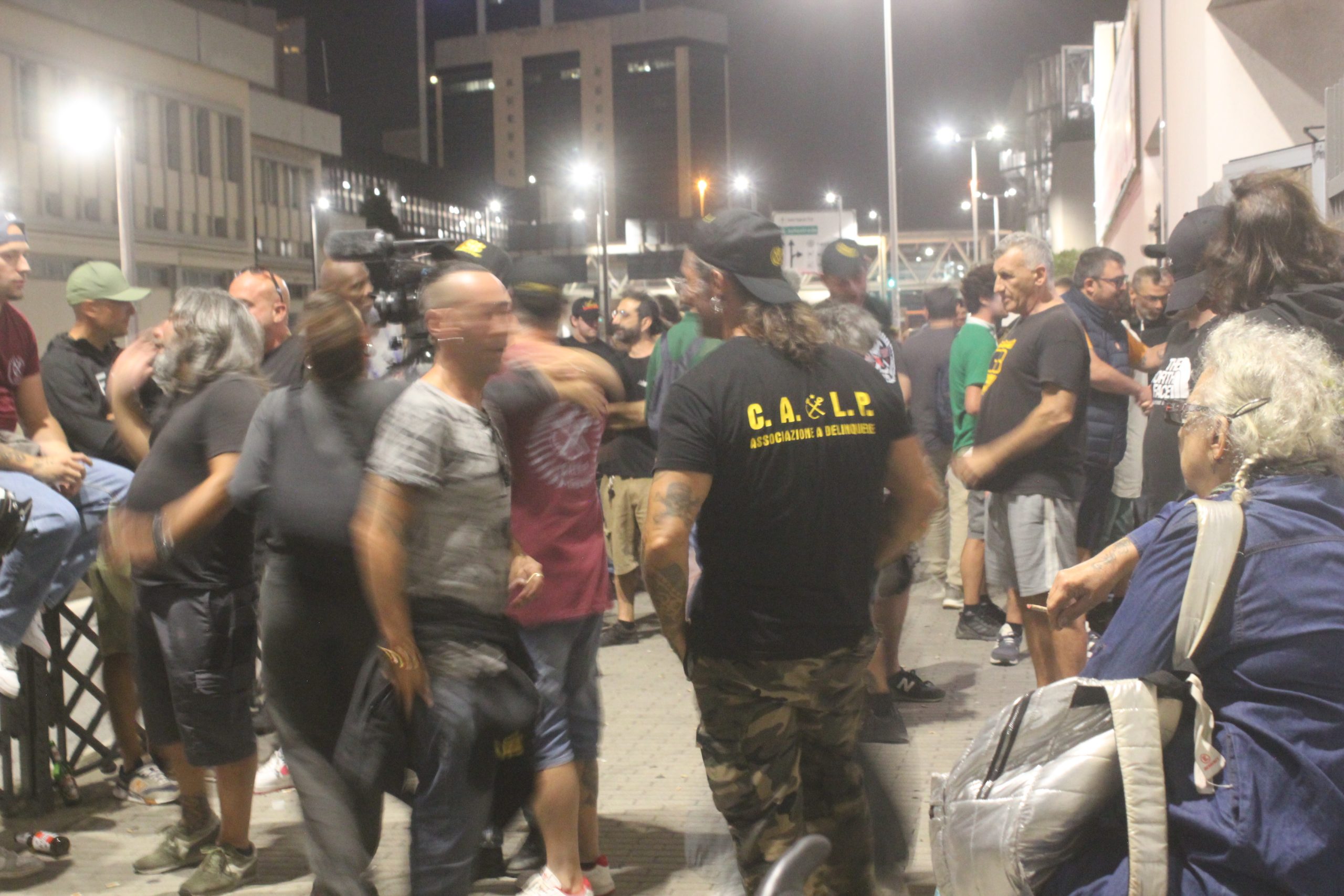As the sun began to set over the northern port city of Genoa, keffiyeh-bearing students and dockworkers gathered outside the Circolo Autorità Portuale e Società del Porto di Genova (Port Authority and Port Society of Genoa Club), waiting for a historic meeting to take place. The Unione Sindacale di Base (USB) and Collettivo Autonomo Lavoratori Portuali (CALP) trade unions were hosting an organisational meeting to outline their strategy and vision for planned strike action in solidarity with Palestinians in Gaza and the Global Sumud Flotilla. A couple of weeks prior, a video of the main spokesperson for CALP, Riccardo Rudina, had made the rounds as he announced, ‘Around mid-September, these boats will arrive near the coast of Gaza. If we lose contact with our boats, with our comrades, even for just 20 minutes, we will shut down all of Europe.’
Such a proclamation is a big ask for a small city like Genoa, but its history of solidarity with oppressed people runs deep. As Rudina from CALP explained, ‘Genoa has always made the right choices’ — the city has consistently stood against fascism and oppression throughout its history. This tradition of resistance is woven into the fabric of the city’s identity. Genoa was instrumental in bringing down the Tambroni government in 1960, when mass protests against the neo-fascist Italian Social Movement’s congress forced the prime minister to resign. The city paid an enormous price in blood during the anti-fascist resistance, and those scars are still visible today.
More recently, Genoa became synonymous with global resistance during the 27th G8 summit in 2001, when over 200,000 protesters descended on the city to challenge neoliberal globalisation. What was intended as a peaceful demonstration against global inequality and corporate power quickly escalated into one of the most brutal police crackdowns in modern European history. The violent state response that followed — including the killing of 23-year-old protester Carlo Giuliani and the overnight raid on the Diaz school where demonstrators were sleeping — only reinforced the city’s reputation as a place where ordinary people stand up to power, often at great personal cost. The scale of police brutality was unprecedented: hundreds of protesters were injured, over 280 detained, with many suffering systematic torture and abuse at the Bolzaneto detention facility. Detainees were reportedly slapped, kicked, punched and spat on, subjected to threats of rape and sexual abuse, and deprived of food, water and sleep for lengthy periods. Despite multiple trials beginning years later, most officers involved were never held accountable; many couldn’t even be identified because they had covered their faces and removed identification numbers during the attacks.
For Genoese residents like Camilla, a local activist from the working-class neighbourhood of Sampierdarena, the G8 events became a defining moment that crystallised the city’s anti-authoritarian spirit. The fact that her city had been chosen as the stage for such state violence, and that she had witnessed firsthand how power responds to dissent, only deepened her commitment to solidarity movements. For Camilla, this history of resistance is simply part of growing up in Genoa. ‘Being a person from Genoa and growing up in one of the proletarian neighbourhoods of this city, I think it’s quite inherent to my life to be involved in these movements,’ she explained. ‘Genova is a city that moves when it’s necessary and that has a history of caring for certain global or local issues.’
It was this deeply rooted tradition of protest that brought hundreds of people together on September 11th. The organisational meeting culminated in USB’s declaration of a general strike across all public and private sectors, which will take place on September 22nd. As Rudina from CALP explained, ’Internationalism has always been a patrimony of port workers, in Genoa and everywhere’ — a tradition stretching back to battles against the Vietnam War, the Chilean coup, and the Greek colonels’ regime. (Since 2019, CALP has waged a determined campaign against arms trafficking after discovering the Saudi state company Bahri was shipping incredible quantities of weapons — tanks, helicopters, and explosives — through Genoa’s port to fuel conflicts in Yemen.) ’We who fight against arms trafficking and for the boycott of arms traffic to Israel have been doing this for years,’ Rudina noted, emphasising that logistics companies are ‘the most important link in the chain — they’re the ones who set conflicts in motion, fuel them, delay them or accelerate them.’
This courageous stance has come at a significant cost. ’We’re fighting this battle, which has also brought us a thousand problems, investigations into criminal association, everything that happened,’ Rudina said. ’We were under pressure for a while, but we recovered. There was also that intervention by Pope Francis, who, in our opinion, was the first to help us in that difficult moment.’ The Pope’s support proved crucial — not only did his intervention provide political cover for CALP’s actions, but his subsequent condemnations of the genocide in Gaza have lent moral authority to the dockworkers’ resistance. Since then, CALP has continued to respond to calls from Palestinian unions, working with international partners in ports like Piraeus and France to identify and block weapons shipments to Israel, though Rudinanoted with concern: ’I would still like to know if those who asked us to intervene on the weapons issue because they knew what happened would happen are still there in Gaza.’
The September 22nd strike represents an escalation of this ongoing resistance, with USB reserving the right to call earlier action if the Global Sumud Flotilla faces interference before that date. The thousand-strong assembly was electrified by a video message from José Nivoi, a CALP member aboard the flotilla, and received powerful support from UN Special Rapporteur Francesca Albanese, who expressed ’full solidarity with port workers and the necessity of blocking the system.’ The mobilisation has already spread beyond Genoa, with ports across Italy — from Venice to Ancona — pledging solidarity actions, while international coordination is building toward a global port workers’ meeting scheduled for next week in Genoa.
